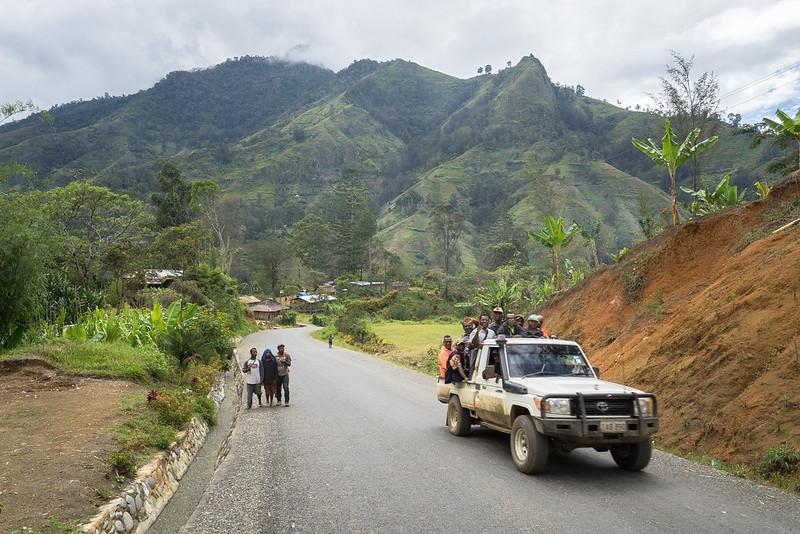
Australia is a founding member of the Asian Development Bank and, since 1966, has directly contributed US$8.5 billion in capital subscriptions, as well as US$2.86 billion to special funds. Our annual subscription this year is around US$430 million—more than that of the People’s Republic of China.
Since the ADB’s establishment, Australian companies and consultants have won just US$1.75 billion in procurement contracts on ADB-funded projects. So, by any measure, we have been more than generous contributors.
No one doubts the value of ADB grants and loans in our region. In particular, it has long been a major contributor to our closest neighbour, Papua New Guinea.
The total value of ADB projects in PNG is just over US$3 billion. Of that, US$1.82 billion has gone into the transport sector—roads, airports and ports.
What is now of real concern is that increasingly ADB-funded projects in PNG have been awarded to a small group of PRC construction companies. This is an issue that demands urgent and serious examination by the Australian government,
By my estimate, more than three-quarters of recent contracts have gone to PRC companies, most notably the state-owned conglomerate China Railway Construction and Engineering Group. As far back as 2012, China Railway won the lucrative contract for the Lae Port redevelopment—funded by the ADB—in a process which former PNG urban development minister Ken Fairweather tells me was hardly competitive.
The stranglehold that PRC companies have over the construction sector in PNG has been tightening for some years, and began well before PNG signed up to the Belt and Road Initiative in 2018. Today, it is so dominant that Australian, New Zealand and even PNG construction companies no longer bother tendering for most PNG government contracts, including those funded by the ADB.
PRC companies are currently implementing an ADB-funded program that involves upgrading no less than eight provincial airports right across PNG. Australian and PNG companies have not had a look-in.
It’s the same story in road construction and rehabilitation. More than US$1 billion worth of ADB contracts have gone to PRC companies in and around Port Moresby, Lae and Mount Hagen. To that can be added hundreds of millions of dollars for smaller projects elsewhere in PNG.
I am advised that four or five PRC construction companies have recently been lobbying PNG ministers and officials for other road projects valued at close to US$4 billion. It remains to be seen whether these projects are funded by China Exim Bank loans or ADB loans.
Australia is not entitled to seek a privileged position for our construction companies in relation to ADB-funded projects in PNG, or anywhere else. But we are entitled to insist on a transparent process not just in the ‘invitation’ phase, but in the actual awarding of contracts, which in PNG is principally done by the National Executive Council based on ‘recommendations’ from the bureaucracy.
This issue can no longer be put in the ‘too hard’ basket by the Australian government.
And there’s an even greater sense of urgency now that the PNG government is planning a massive national roadworks program over the next decade or more which is worth around K20 billion (A$8 billion).
Just how such a program can be funded at a time when PNG’s debt-to-GDP ratio is around 50%, and headed for an eye-watering 60%-plus in the near future, remains to be seen.
But the very fact that it is now national government policy makes it even more urgent for Australia, along with New Zealand, to act.
The federal government needs to urgently call a ‘virtual summit’ with Australian construction companies, engineers, architects and planners to get an up-to-date assessment on the full extent of PRC companies’ dominance in the government construction sector, including ADB-funded projects. It will be shocked by what it will hear.
It also needs to engage with the New Zealand construction sector and, most importantly, with PNG’s construction industry, which is suffering just as much from the growing dominance of Chinese companies on ADB tenders and on projects funded by the PNG national and provincial governments.
Australia needs to then engage with the ADB and with the highest levels of the PNG government and insist on a level playing field on every tender process, especially for road, airport and port projects.
It also needs to consider offering incentives to Australian and PNG companies to engage robustly in the tender process, and in the training of PNG apprentices, including in the TAFE system in Australia. If need be, concessional loans should be made available to both Australian and PNG companies to get right in the game and compete with the PRC construction companies that are well entrenched in PNG.
Yes, the recently established Australian Infrastructure Financing Facility for the Pacific will help Australian and PNG companies in gaining concessional finance, which will enable them to compete against Chinese companies. But what the Australian facility plans to offer is small beer when compared with what the ADB is funding, and what the China Exim Bank is funding.
The most recent indication from the managers of the Infrastructure Financing Facility was that it hoped to gain approval for around A$300 million in loans and grants by 30 June. That is nowhere near enough.
The time has come for the Australian government to ask the ADB serious questions, and develop a constituency that will help wrest a reasonable share of infrastructure work in our closest neighbour from the clutches of well-resourced, aggressive and well-connected PRC companies that currently have free rein right across the important infrastructure sector in PNG.
If it does not happen soon—very soon—it will simply be too late.